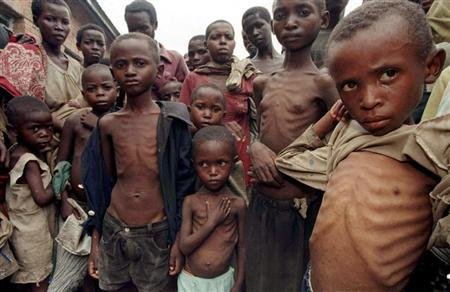Rwanda has also been a country of increasing hunger
If the Rwandan government can lie about its involvement in the Democratic Republic of Congo for more than 17 years, how many other lies can it be carrying related to its internal policies? Rwandans' general prosperity is one of such many lies.

The image of hunger in Rwanda despite the economic miracle that president Paul Kagame is credited with.
Reuters reported on Friday 26th July 2013 that the United Nations pledged $400 million over five years to help Rwanda reduce poverty, hunger and disease.
"Rwanda relies on external funding, including aid, for about 40 percent of its budget, which stands at 1,653 billion francs ($2.6 billion) for the fiscal year that started this month," writes the newspaper.
The source adds that: "Some $276 million will go towards development – including health, nutrition, education and the environment – while the rest will go to economic and governance projects, the government said in a statement issued on Thursday."
Countries usually supporting the Rwandan government last year cut or held back aid over its alleged backing of rebels in the neighboring Democratic Republic of Congo, but Kigali has never admitted to such allegations despite strong evidence of its persistent involvement.
Surprisingly, while foreign partners of Rwanda see special priority in supporting pro-people efforts to alleviate the suffering of Rwandans, president Paul Kagame and his government don't seem to care about what the population is going through in its day-to-day experience.
People remember the $400 million of eurobonds that Kigali attracted from the international financial market back in April 2013.
That amount of money was raised very quickly, but what is questionable was the purpose that it was planned to fulfill.
With such financial resources, Rwanda plans to use $200 million to repay loans on the Kigali Convention Centre and a development plan for Rwandair, the national carrier, according to a copy of the prospectus obtained by Bloomberg News. Another $150 million was meant to be spent completing the center and $50 million on a hydropower plant, according to the prospectus.
The government was also planning to sell stakes in 13 state- owned companies focusing on agriculture, services, transport, banking and insurance industries by the end of the fiscal year of 2014 to 2015, raising about 10 billion Rwandan francs ($15.7 million), according to the prospectus.
This information explains that the Rwandan president Paul Kagame is more than anything else concerned by economic policies which benefit a tiny minority of Rwandans, mainly contributing to the strengthening of his political power, all this at the expense of the general population.








No comments:
Post a Comment
Note: only a member of this blog may post a comment.